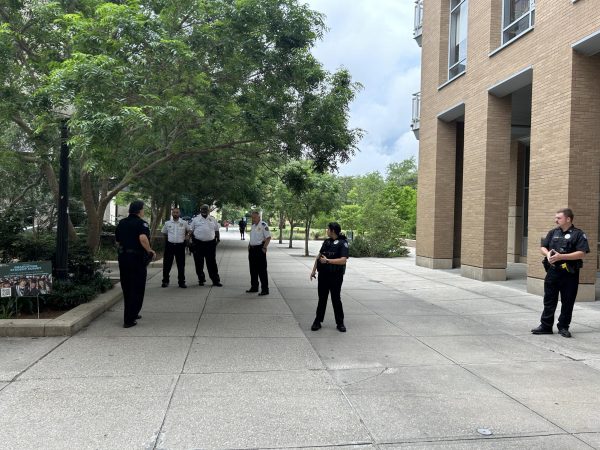A group of 11 professors arrived at Gibson Hall Friday morning to deliver an open letter signed by 250 faculty members that condemned the university’s response to a pro-Palestinian encampment and demanded it drop suspensions against seven students involved.
Nine armed police officers stopped the group from entering Gibson. Ian Morrison, vice president of university communications and marketing, accepted the letter outside the building.
Earlier that morning, a group of students also delivered an open letter signed by 850 students that demanded Tulane drop the protesters’ suspensions.
“I feel incredibly unsafe,” history professor Jana Lipman said in reference to police presence on Friday morning. “I’m a Jewish faculty member. I feel less safe today than I did last week. And I have never felt like this on campus before.”

The letter came days after the New Orleans Police Department and Louisiana State Police surrounded and cleared a small pro-Palestinian tent encampment near Tulane’s Gibson Hall. Police arrested 14 protesters — two of whom were Tulane students — and suspended seven Tulane students for participation in the protest on university property.
Lipman said faculty were motivated to write the letter after learning the university suspended the seven students. Faculty started circulating the letter on Wednesday.
“We have 250 faculty who felt strongly enough to sign their names,” Lipman said. She said the signers were calling on Tulane to “de-escalate force,” to condemn “excessive police presence” and to demand “that our students’ suspension should be dropped and that faculty and staff should not be intimidated.”
Tulane, which has 7,000 undergraduates and 1,200 faculty members, said in a statement on Friday the decision to clear the encampment was made after two days of verbal and written warnings and to avoid the “dangerous escalation” taking place on other college campuses, and that it offered “ample time, opportunity and choice to disperse.”
The school said “representatives of university leadership met with” the faculty and student signers Friday morning. Lipman disputed that and said “there was no meeting” or dialogue.
“We fully support the freedom of speech and assembly,” Tulane’s statement said. “These rights must be exercised, however, in a manner that does not disrupt our academic mission, compromise the safety or the free speech of others, or hinder support systems for our students.”
Jewish student leaders this week condemned the encampment and said it had made some students at Tulane feel unsafe. The police presence during the protest “made me feel safer,” Bali Levine, the incoming president of Students Supporting Israel said on Tuesday.
“Tulane is a Jewish school,” said Zoe Silverberg, who on Monday helped organize a pro-Israel rally on the Berger Family Lawn. “I never thought it was going to happen here but it’s happening now,” she said Tuesday. “It’s not just disturbing, I’m shook to my core.”
The school’s statement acknowledged the dozens of police in riot gear that cleared the encampment early Wednesday “may have appeared to be discomforting to many.”

“The administration had an opportunity to have conversations with the protesters, their own students,” environmental science professor Jennifer Veilleux said, adding she was “shocked” by the “disproportionate use of force” used to clear the encampment.“Instead of the administration showing up in person to have a conversation, they sent in police, and I see that as an abuse of power.”
NOPD Superintendent Anne Kirkpatrick said Wednesday morning the department would review “all complaints associated with injury.” The New Orleans Independent Police Monitor, which is reviewing the sweep, said Wednesday it would look “at every action taken to ensure that it all matches NOPD’s policy” but had not publicly raised concerns of injury as of Friday evening.
Several professors met on May 1 in a meeting with the American Association of University Professors to discuss the administrative reaction to the encampment and strategize on how to respond, according to Veilleux.
“I was surprised to see how the students’ mobilization was framed from the start in terms of ‘hate speech,’ ‘harassment,’ ‘intimidation,’ ‘violence,’ and ‘criminal acts,’” communications professor Mauro Porto said in an email, citing several statements from the Tulane leaders regarding the encampment. “This framing of the student actions was not only reductionist and inaccurate.”
Administrators sent faculty an email on May 1 that warned they could be subject to disciplinary action for any participation in the “unlawful demonstration,” according to assistant professor of social work, Margaret Mary Downey.
Downey said the email, without clear additional context or examples of incidents, created “an incredibly stressful and alarming environment to work and care.”
Professor of computer science, Carola Wenk, said several non-tenured faculty have expressed concern to her about their job security if they spoke out against administration or spoke with protesters.
“That kind of chilling effect,” Wenk said, “is against anything university stands for.”



